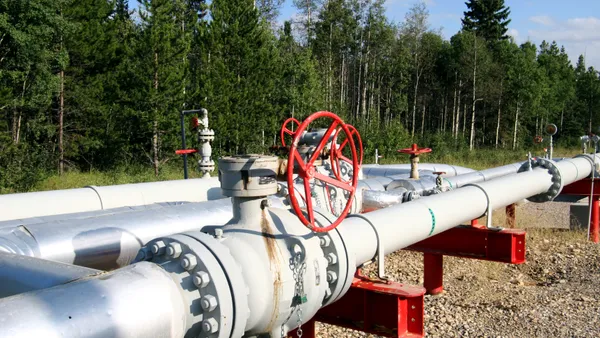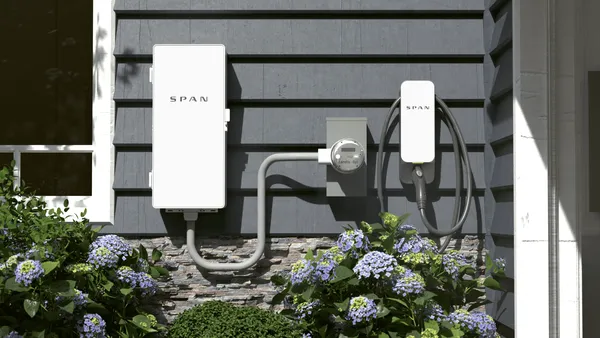Dive Brief:
- Dominion Energy is gearing up to invest $26 billion over the next five years on emissions reduction investments for its electric utility and gas distribution businesses, company leadership said during the first quarter earnings call on Tuesday.
- Of that total, $17 billion represents zero-carbon generation and energy storage, including offshore wind and nuclear relicensing, as the Biden administration presents plans to increase grid decarbonization incentives. "To the extent we see opportunities with the Biden plan, we'll take advantage of them, but at this point, we don't exactly know," CEO Bob Blue said during the call.
- The utility submitted its triennial review to Virginia regulators at the end of March, which covers its earnings between 2017 and 2020 and will be the basis for a regulatory decision later this year on whether or not its base rate earnings should change. Dominion's Virginia subsidiary contributed about 57% of the company's first quarter earnings, and the company requested regulators increase the base return on equity for the next triennial period from 9.2% to 10.8%.
Dive Insight:
Dominion has identified nearly $72 billion dollars of investment opportunities in decarbonization from 2020 through 2035, which would leverage its resources and experiences with technologies like offshore wind.
Dominion's offshore wind pilot off the coast of Virginia is the only U.S. wind farm currently operating in federal waters, and the company is looking to leverage that Bureau of Ocean Energy Management (BOEM) permitting experience as it pursues its goal of expanding offshore wind energy. The utility sees the potential for up to $17 billion of investment in offshore wind by 2035.
"The [BOEM] leadership and the administration clearly thinks offshore wind is good economically and to meet carbon goals," Blue said on the earnings call.
Dominion also sees the opportunity to invest up to $20 billion over the long term in solar, and up to $7 billion in energy storage. The Virginia Clean Economy Act requires the utility to procure a combined 16 GW of solar and onshore wind by the end of 2035.
Other investments foreseen by Dominion include up to $15 billion in electric grid transformation, up to $4 billion in extending life of existing nuclear assets and up to $9 billion in modernizing gas distribution and renewable natural gas.
Dominion has sought to be an early adopter of blending hydrogen and renewable natural gas into its gas distribution business, according to Diane Leopold, the chief operating office.
"We see a combination of moving forward with continued pilots and testings of hydrogen blending throughout our [gas distribution] system," Leopold said during the call.
Analysts on Tuesday's call asked if the financial burden of these investments might be lessened for the utility by the proposed tax benefits in Biden administration's infrastructure plan, such as the potential for an energy storage tax credit.
While it's too early to tell, Blue claimed Dominion is "very well positioned" to decarbonize reliably and affordably.
The state's regulatory activity has presented a "somewhat weaker [investment opportunity] in terms of its treatment of utilities, but we believe it remains a constructive environment," Edward Jones wrote in its Dominion ratings note on Tuesday. Democrats, who won control of the state legislature in 2019, have advanced a variety of bills that the utility has opposed. In addition, state regulators are putting more pressure on utilities nationwide regarding their spending due to the economic pressures of the pandemic and concerns about grid reliability, according to Edward Jones analyst Mike Doyle.
"There may be a bit more of a firm regulatory environment across the nation," particularly "in the states where you have had historically solid regulatory environments," Doyle said, referencing Virginia and South Carolina, another region served by an electric utility owned by Dominion.
Local news coverage has described the upcoming triennial review proceeding, which will cover four years instead of three for Dominion, as "the one everyone has been waiting for," to determine if the largest utility in the state has been charging customers reasonable base rates.
Customers could receive compensation for overpaying the utility in the event that the Virginia State Corporation Commission deems the base rate has been too high.
Dominion's triennial review filing reflects over $300 million of capital investment in renewable energy and grid transformation projects between 2017 and 2020 which the utility believes would meet eligibility criteria for reinvestment credits for customers.
"We're delivering increasingly clean energy while protecting reliability and safeguarding affordability," Blue said.















